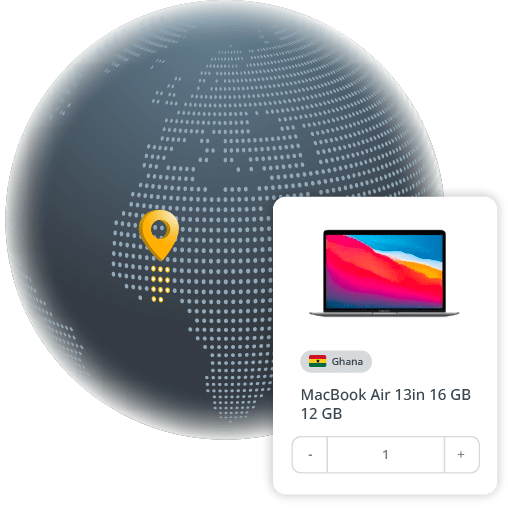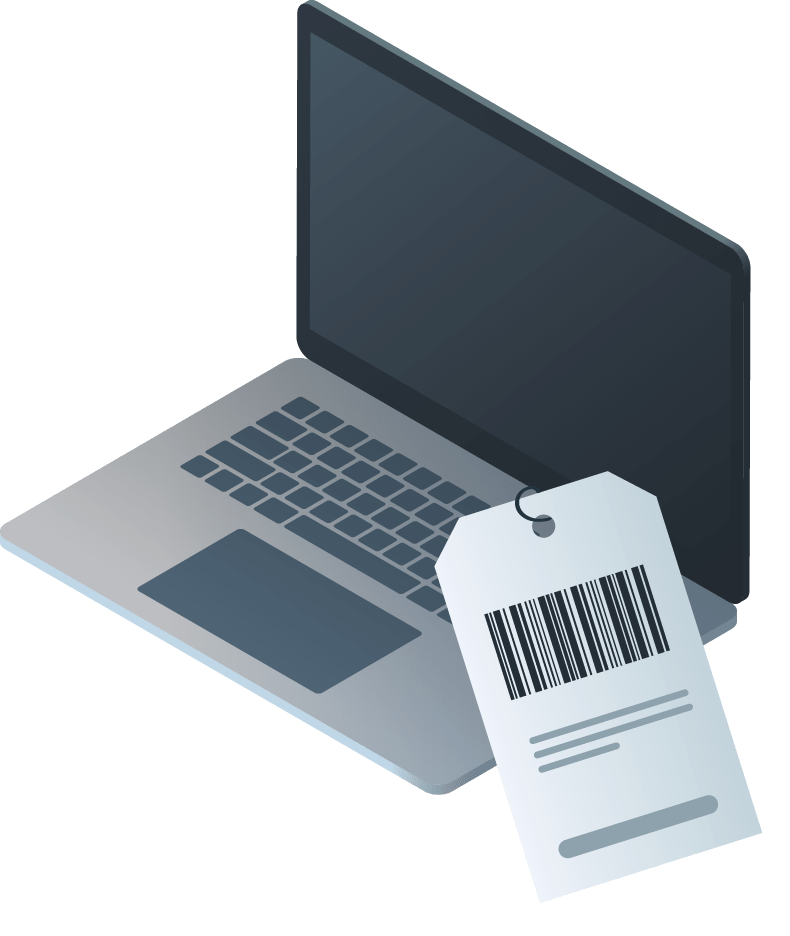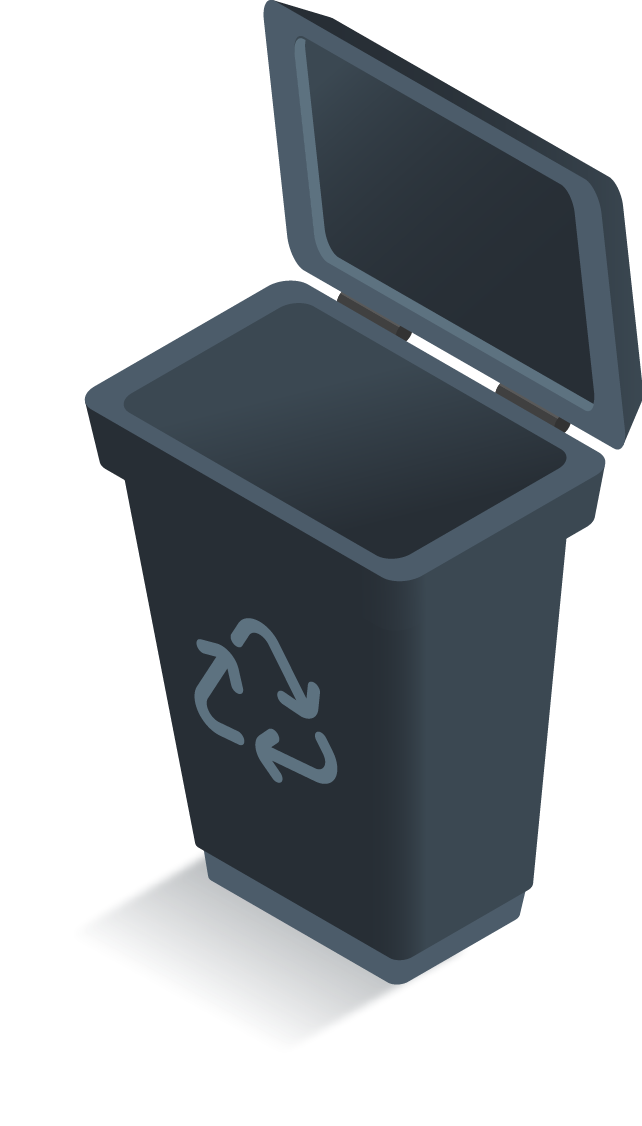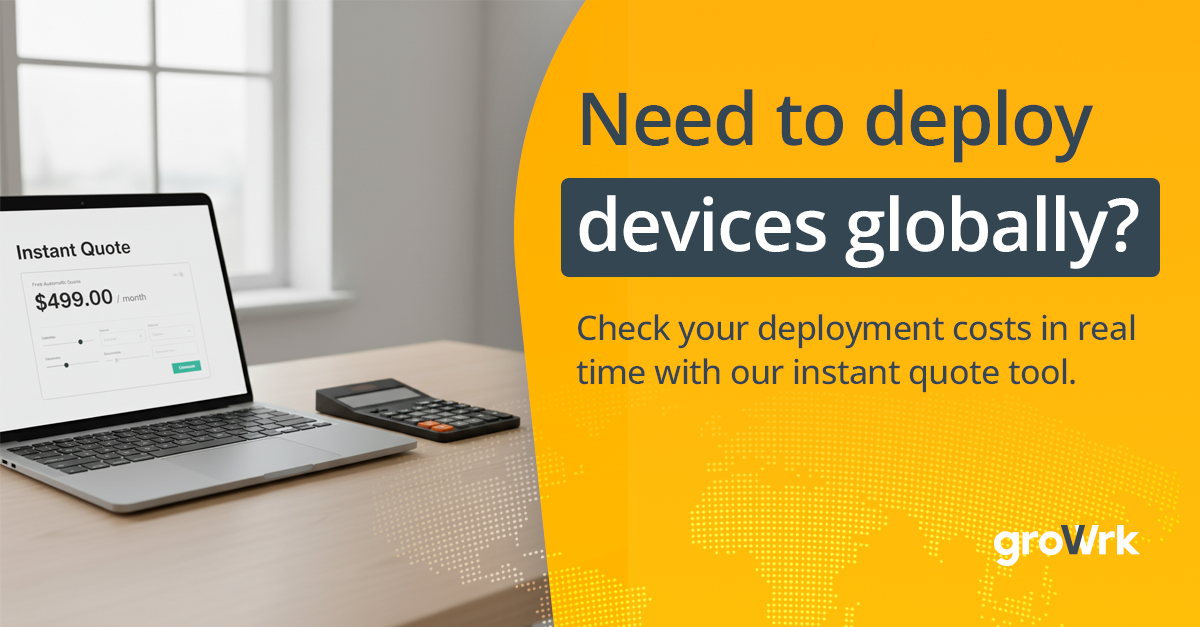How to send IT equipment to Ghana
Empower Your Remote Teams in Ghana with Hassle-Free IT Equipment Delivery. At GroWrk, we make it easy to equip your remote teams in Ghana with the laptops, servers, and tech they need—seamlessly and stress-free. From smooth logistics to effortless customs clearance and full compliance, we handle every detail so you can focus on scaling your business with confidence. Let’s get your team set up for success with our detailed guide.

At a glance
Ghana is emerging as a key player in the IT and digital innovation space in West Africa, with a growing tech ecosystem. The country has been investing in IT infrastructure, digital education, and software development, making it an attractive destination for IT outsourcing and remote tech teams.
|
CURRENCY Ghanaian Cedi (GHS) |
OFFICIAL LANGUAGE English |
TIME ZONE Greenwich Mean Time (GMT) |
|
CUSTOMS DUTY ON ELECTRONICS Typically, 5% to 35% customs duties and 15% VAT on imported goods valued over GHS 500. |
SHIPPING LEAD TIME 5–10 days (depending on shipping method and customs clearance) |
IT OUTSOURCING MARKET Growing steadily, with increasing focus on software development, digital services, and fintech. The market is expected to reach USD 890.80 million by 2029. |
Overview of IT operations in Ghana

Growing IT sector: Ghana’s IT industry is expanding rapidly, particularly in software development, mobile technology, and fintech, with government initiatives like the Digital Ghana Agenda supporting digital transformation and tech education.
Improving IT infrastructure: The country is enhancing its fiber networks, data centers, and broadband connectivity, especially in urban centers like Accra, Kumasi, and Takoradi.
Skilled workforce: Ghana has a talented pool of IT professionals skilled in software engineering, cybersecurity, and digital services, with universities and tech hubs offering quality tech education programs.
Regulatory compliance: The country enforces data protection regulations under the Data Protection Act, 2012, which impact IT operations and data security practices.
Evolving tech ecosystem: Accra, Kumasi, and Takoradi are becoming tech hubs, with innovation centers, co-working spaces, and tech education initiatives supporting the growth of the sector.
Shipping IT equipment to Ghana: What you need to know
| Customs regulations |
|
| Duties and taxes |
|
| Required documentation |
|
| Customs clearance process |
|
| New vs. Used equipment |
|
| Penalties or fines for non-compliance |
|
Checklist for sending laptops to Ghana
When shipping laptops to Ghana, it’s important to follow a few best practices to ensure the process goes smoothly, and your equipment arrives safely and on time. Here are some helpful shipping tips:

Select trusted couriers: Use trusted couriers like GroWrk, DHL, UPS, FedEx, or Ghana Post. These providers are familiar with Ghanaian customs protocols and offer reliable tracking systems to ensure visibility throughout the shipping process.
Check service levels: Select the appropriate shipping option based on urgency. Express shipping (3-7 days) for high-priority deliveries. Standard shipping (7-14 days) for cost-effective options.
Use high-quality packaging: Secure laptops with sturdy, padded boxes and protective materials like bubble wrap, foam inserts, or air cushions to prevent damage during transit.
Disassemble where possible: If shipping accessories like chargers, docking stations, or monitors, package them separately to prevent damage. Remove detachable components if applicable.
Label clearly: Ensure the recipient’s name, address, and contact details are correctly labeled. Mark the package as "fragile" to encourage careful handling.
Accurate product descriptions: On the commercial invoice, provide a detailed and accurate description of the laptop, including its brand, model, and serial number. Inaccurate descriptions may cause customs delays.
Value declaration: Declare the correct value of the laptop to avoid under- or over-declaring, which could lead to customs inspections or fines. The declared value determines any applicable duties and taxes.
Customs declarations: Required documents include the commercial invoice, packing list, and air waybill. For business imports, a Tax Identification Number (TIN) or VAT registration number may be required. Personal shipments may also be subject to ID verification. Depending on the device's classification, an import permit might be necessary.
Proof of origin: If the shipment qualifies under a trade agreement such as the ECOWAS Trade Liberalization Scheme (ETLS), include a certificate of origin to potentially reduce duties or facilitate faster clearance.
Understand import duties & taxes: Laptops are typically subject to a 0% customs duty in Ghana, but they are still liable for VAT at 15% of the CIF value. Additional fees may include a National Health Insurance Levy (NHIL), Ghana Education Trust Fund (GETFund) levy, and ECOWAS levy, all of which vary slightly depending on the product classification and declaration.
Pre-pay duties and taxes: Some couriers allow for pre-paid duties and taxes to simplify customs clearance and prevent the recipient from facing unexpected charges upon arrival.
Protect against loss or damage: Consider purchasing shipping insurance for high-value laptops to protect against loss, theft, or damage during transit.
Compliance with Ghanaian regulations: For commercial imports or high volumes, laptops with wireless or cellular functionality may need to meet National Communications Authority (NCA) or Ghana Standards Authority (GSA) requirements. Personal shipments are generally exempt but could still be inspected.
Use tracking tools: Major couriers provide real-time tracking—monitor shipments closely to anticipate customs clearance updates and delivery progress.
Stay in touch with the recipient: Notify the recipient about the expected delivery timeline, tracking updates, and any customs-related requirements to avoid delays.
Expect weather and seasonal delays: Ghana’s rainy seasons, particularly from April to June and September to November, can occasionally disrupt inland transport. High shipping volumes during festive seasons like Christmas may also slow clearance and delivery.
Ghanaian domestic delivery options: For final delivery, consider using local services such as Ghana Post, DHL Ghana, or smaller logistics companies operating in Accra, Kumasi, and Takoradi. These providers often handle final delivery after customs clearance is complete.

Average cost of IT Equipment in Ghana
Laptops (Business Grade):
- Mid-range: $425 – $850 USD
- High-end: $850 – $1,700+ USD
High-end models such as Apple MacBook Pro, Dell XPS, and Lenovo ThinkPad are priced on the higher end.
Monitors (Business Grade):
- Standard: $85 – $255 USD
- Ultrawide/4K: $255 – $510+ USD
Monitors from trusted brands like Dell, Samsung, and LG typically range within these prices, with 4K or ultrawide models costing more.
Desktops (Business Grade):
- Standard Desktop PC: $255 – $680 USD
- Workstation Desktop (for high-performance tasks): $680 – $2,125+ USD
Prices depend on the brand and specifications, with options from HP, Lenovo, and Apple among the most common.
Printers (Laser):
- Standard Office Printers: $85 – $255 USD
- High-Volume Printers: $425 – $1,275+ USD
Leading brands such as HP, Canon, and Brother offer a wide range of models for office environments.
Public holidays & IT work hours to plan your shipment
Key public holidays in Ghana:
- New Year’s Day – January 1
- Independence Day – March 6
- Good Friday – March/April (variable)
- Easter Monday – March/April (variable)
- May Day (Workers’ Day) – May 1
- Republic Day – July 1
- Christmas Day – December 25
- Boxing Day – December 26
Typical work hours for IT professionals
- Standard week:
- The typical workweek is 40 hours, with standard business hours from 8:00 AM to 5:00 PM, Monday to Friday, with a one-hour lunch break from 12:00 PM to 1:00 PM.
- Many IT companies, especially those working with international clients, have adopted more flexible working hours to accommodate different time zones.
- Employees usually take a lunch break of 30 minutes to 1 hour, aligning with Western work culture norms.
- Overtime:
- Overtime is regulated under Ghanaian labor laws.
Employees may work up to 2 hours of overtime per day. - Overtime pay is typically 1.5 times the hourly wage on weekdays and 2 times on weekends and public holidays.
- Some companies offer compensatory time off instead of overtime pay.Overtime:
- Overtime is regulated under Ghanaian labor laws.
- Public holidays:
- Working on public holidays is generally not required unless specifically agreed upon.
- If an employee works on a public holiday, they are entitled to double pay or an alternative day off.
- Many businesses close completely during major holidays like Christmas, New Year, and Easter.
What to consider when retrieving IT equipment from employees in Ghana
| Local delivery and logistics services |
|
| Inventory management |
|
| Logistics challenges for remote locations |
|
| Equipment agreement with employees |
|
How to dispose of IT equipment in Ghana
E-Waste Recycling:
- Certified e-waste handlers: Businesses must dispose of IT equipment through registered e-waste recycling providers in compliance with Ghana’s environmental laws.
- Municipal collection points: Some major cities have established e-waste collection points for the proper disposal of electronic equipment.
- Manufacturer take-back programs: Several electronics manufacturers have begun implementing take-back programs in Ghana.
Data Destruction:
- Wipe data completely: Use certified software to erase all stored data to prevent unauthorized access.
Physical destruction: For highly sensitive data, consider shredding or degaussing hard drives and SSDs.
Certification: Request data erasure certificates for corporate compliance purposes.
Repurposing or Donating:
- Support education & communities: Donate working computers to schools, non-profits, or community programs in underserved areas.
Internal reuse: Older devices can be reassigned for secondary tasks before disposal.
Refurbishment programs: Partner with local refurbishment centers that can extend the life of IT equipment.
Manufacturer Recycling Programs
- Brands like Dell, HP, and Apple offer take-back programs for safe recycling or refurbishment. These programs ensure that old or used IT equipment does not end up in landfills, helping to reduce environmental impact. Many manufacturers provide incentives, such as discounts on new devices, for customers who return old equipment for proper disposal.

Local IT Outsourcing Solutions in Ghana
You can streamline your IT logistics and asset management with GroWrk’s comprehensive global solution. Whether it’s shipping equipment or managing IT assets across multiple regions, GroWrk helps you stay compliant and efficient, every step of the way. Here’s why GroWrk is the ideal partner for managing your IT assets in Ghana:

| 1. Wide global coverage |
GroWrk operates in 150+ countries (including Ghana), delivering IT gear anywhere without a hitch. We know Ghana’s rules inside out—so your deployment is fast, compliant, and built for your needs. |
| 2. End-to-end asset management |
From procurement to deployment, maintenance, and secure disposal, GroWrk manages the full lifecycle of IT assets. This allows businesses to focus on growth while ensuring smooth and secure IT operations across Ghanaian locations. |
| 3. Intuitive platform for easy deployment |
Our centralized platform simplifies IT equipment management by enabling real-time tracking, shipment monitoring, and asset usage insights. This reduces administrative workload and enhances operational efficiency across Ghanaian offices. |
| 4. Smooth delivery and equipment retrieval |
GroWrk ensures the smooth delivery of IT equipment to employees throughout Ghana, including in challenging locations. We also manage the return of devices from departing employees, making the process cost-effective, streamlined, and hassle-free. |
| 5. Compliance with Ghanaian import regulations |
We handle all aspects of IT import compliance, including customs clearance, VAT, and electronic equipment regulations. By aligning with Ghanaian customs requirements, GroWrk prevents delays and ensures a smooth supply chain. |
| 6. Efficient repairs and maintenance |
From routine servicing to urgent repairs, we coordinate IT equipment upkeep to minimize downtime. Our network of expert technicians throughout Ghana ensures that devices remain in optimal working condition, allowing employees to stay productive. |
| 7. 24/7 Support for peace of mind |
Our dedicated IT asset management support team is available round-the-clock to assist with IT asset management, logistics, and troubleshooting. With GroWrk, businesses in Ghana can rely on expert support anytime. |
Procure, configure, and deploy your IT devices from one platform


